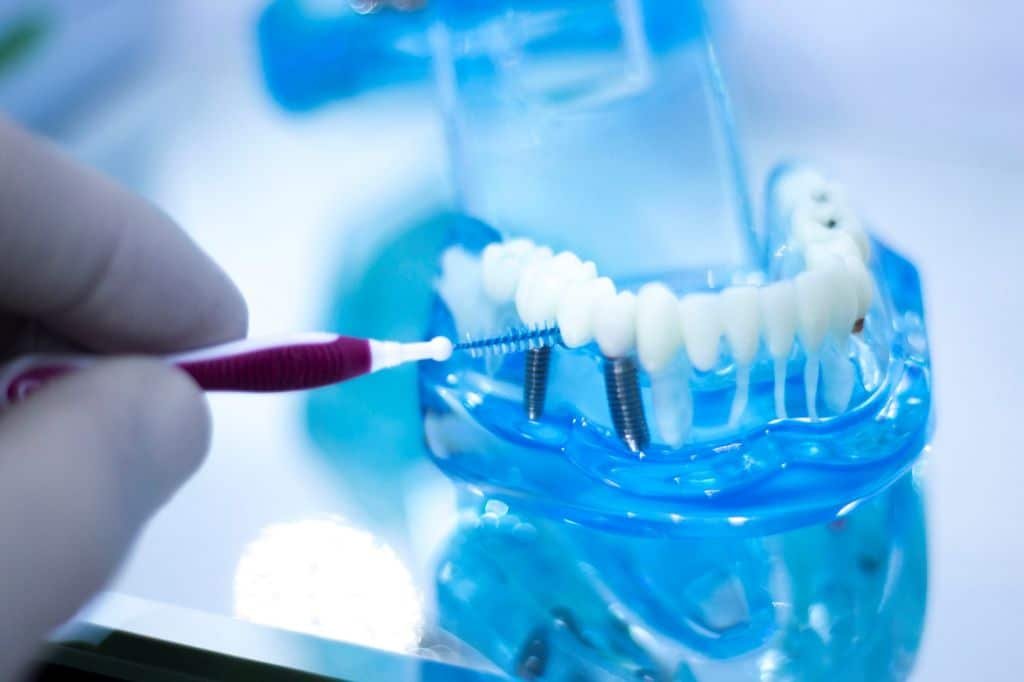Dental implants are an increasingly popular choice over dentures. As they look, feel, and perform like real teeth, dental implants are a wonderful solution if you deal with missing teeth. To optimize the lifespan and function of your dental implants, it’s important to properly maintain them. Here are some helpful tips on how to care for dental implants, whether you have one implant or several dental implants.
Practice Immediate Aftercare Tips
Right after the dental implant procedure, here is what you should do:
- Rest: for a few days after surgery, avoid excessive movement and keep your head elevated.
- Control bleeding: some bleeding after the procedure is normal. Your oral surgeon will provide you with gauze to bite on, to stem the flow.
- Protect the surgical site: The surgical site needs to clot, to heal. To prevent dislodging the clot, do not bend, spit, rinse your mouth, or use a straw for the first 24 hours after surgery.
- Apply an ice pack: you may experience face swelling and tenderness at the surgical site. An ice pack can help manage discomfort and swelling.
Your oral surgeon will provide a more detailed list about brushing and rinsing protocols for the days and weeks following dental implant surgery.
Brush Your Teeth Twice a Day
Some individuals assume that since a dental implant is a fake tooth, it does not require the same amount of brushing and flossing as real teeth. This couldn’t be further from the truth. Since a dental implant is embedded below the gum line, pay careful attention to plaque. Irritated gums not only hurt the effectiveness of your dental implant, but can affect healthy, real teeth. Periodontal disease, or gum disease, is one of the main causes of tooth loss, so keep your teeth clean.
Use A Soft Bristle Brush
To maintain a dental implant, avoid abrasive products, as these can scratch the implant’s surface. Instead, opt for soft bristled toothbrushes, such as a nylon toothbrush. If you are unsure of which exact toothbrush to select, your oral surgeon can provide you with recommendations.
Floss Your Teeth Twice a Day
While daily tooth brushing removes some plaque, flossing is a better way to further remove gunk around your teeth. Don’t skip flossing around an implant.
Avoid Smoking
It can take up to 6 months for a dental implant to properly heal. As tobacco use slows down the healing process, it’s strongly advised that you avoid all tobacco products. Smoking and chewing tobacco restrict blood flow to your teeth and gums and makes you more susceptible to infections. The possible result? Dental implant failure, where the implant fails to settle into your jawbone.
Avoid Alcohol
Alcohol is a blood thinner, which means drinking alcohol after receiving a dental implant can prevent proper healing. It’s recommended you avoid alcohol for several weeks after your dental implant surgery, to allow your implant to fully heal.
Once the initial healing period passes, it’s still wise to avoid excessive alcohol consumption. Constantly drinking alcohol makes your jaw vulnerable to bone loss, which affects the longevity of your dental implants. A strong, healthy jawbone is the foundation for healthy dental implants.
Avoid Hard and Sticky Foods
Hard foods, such as nuts, popcorn kernels, candy, ice, etc., increase the risk of dislodging or damaging a dental implant. Sticky foods, such as gum and sticky candies (like caramel) also pose the same risk.
Manage Teeth Grinding
Bruxism, or teeth grinding, places unnecessary force on your teeth. While dental implants are quite strong, teeth grinding can still damage the porcelain crown (fake tooth) of the implant. Excessive force on the implant also affects the osseointegration process, where the implant’s titanium post fuses with the jawbone.
To protect your dental implant from teeth grinding, wear a custom nightguard. Also try to manage stress, as stress is a bruxism trigger. Go for daily walks and practice meditation to reduce stress.
Schedule Regular Dental Appointments
Optimize dental implants’ longevity with regular visits to your oral surgeon or dentist. They will assess the condition of your dental implants and provide any recommendations to maintain their upkeep.
Treat Your Dental Implants with Respect
While dental implants cannot get cavities, remember to treat them as you would your real teeth, by practicing consistent oral hygiene. Incorporate healthy lifestyle habits by eating healthy foods and avoiding smoking. With proper care, your dental implants can last a lifetime.
This article was written by Leah Campbell for Third Loft Marketing.


